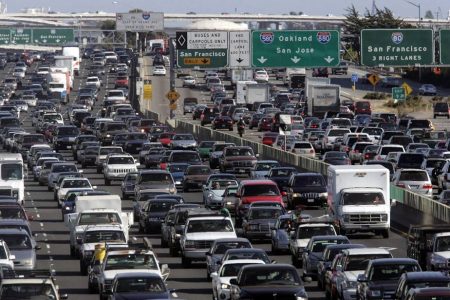October 27, 2018 – When Ontario recently elected a Progressive Conservative majority government, one of its first acts was to end the subsidies offered to purchasers of electric vehicles (EVs). Tesla sued the government and the courts overturned the government’s action. For Tesla, the manufacturer of EVs, it was defending its turf and a program that was providing incentives to purchase its cars. That makes perfect sense.
But south of the border, the Trump administration has been attempting to rollback emission and fuel economy standards for manufacturers of automobiles and trucks. These are standards adopted by the former Obama administration. The Trump regime has gone even further by challenging the State of California and its zero-emission vehicle policies.
California has for the last fifty years demonstrated the most environmentally conscious policies regarding vehicle mileage and emission standards. Responding to the Los Angeles smog conditions prevalent in the 1950s and 60s, governments in California have advanced the agenda for the development of low emission technology through a combination of carrot and stick policies. The state has raised mileage standards progressively and demanded all vehicles sold there be equipped with pollution abatement technology such as catalytic converters.
As California has gone, so has the United States over time with 18 other states, and the District of Columbia joining them in accepting tougher emission, mileage and safety standards. But Trump regulators are trying to end California’s influence regarding automobile standards.
You would think, therefore, that the automakers would be cheering the federal administration for its efforts. Precisely the opposite, two of the world’s largest automakers, General Motors, and Honda are taking California’s side in promoting EVs and increasing mileage standards for vehicle fleets.
General Motors wants to see 7 million long-range EVs on U.S. roads by 2030 which would reduce carbon dioxide emissions (CO2) by 375 million tons annually. And Honda sees the Trump attempt to rollback emission and mileage standards as creating uncertainty in the industry. Honda is also urging a national program acceptable to all automakers.
The Trump administration’s recommendations want to keep fuel economy requirements to 37 miles per gallon (6.35 liters per 100 kilometers) in the period between 2020 and 2026. The Obama administration had called for a fleet standard of 47 miles per gallon (5 liters per 100 kilometers) by 2025. The government of California sees the Trump rollback as a benefit to the oil companies exclusively, and certainly doing nothing to fight climate change. It means that oil consumption by 2030 will be a half-million barrels more per day than if the Obama standards were met.
For General Motors there is a further concern if emission standards are rolled back, and if zero-emission policies such as those adopted in California, are overturned by the federal government. The company sees the chief beneficiary of such acts to be China where its government has adopted aggressive policies to replace gasoline and diesel vehicles with EVs. China may not be alone in this windfall produced by backward-thinking policy. German and Japanese automobile manufacturers, along with their governments, are fully vested in replacing fossil-fuel burning vehicles with EVs and other zero-emission technologies by the end of the next decade.
If Trump succeeds in rolling back emission and mileage standards nationally while California, its 18 state supporters and the District of Columbia adopt their own path, it means manufacturers of vehicles sold in the United States will have to deal with two very different markets. That will raise production, distribution and point-of-sale costs. And it doesn’t help automakers if California and its partner states fight endless court battles with the federal government to determine a jurisdictional winner. The uncertainty this brings will stifle investment. In General Motors and Honda’s support of the California position they are telling the Trump administration they would rather have a common national standard that promotes a move to cleaner, greener vehicles which will make them globally more competitive.
















